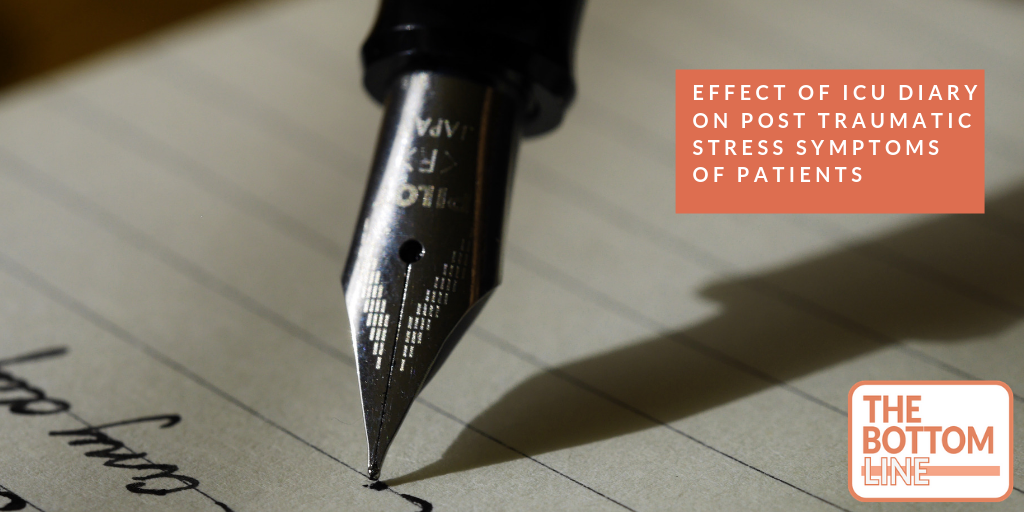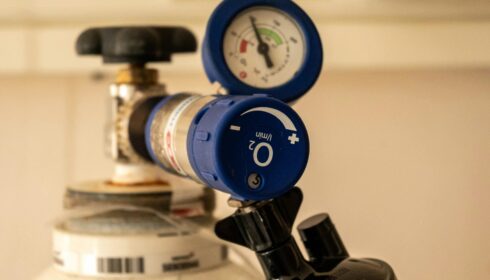Garrouste-Orgeas

Effect of an ICU Diary on Posttraumatic Stress Disorder Symptoms Among Patients Receiving Mechanical Ventilation
A Randomized Clinical Trial
Garrouste-Orgeas. JAMA 2019;(3)229-239. doi:10.1001/jama.2019.9058
Clinical Question
- In intensive care patients, does an ICU diary compared to no ICU diary, reduce post-traumatic stress disorder symptoms at 3 months?
Background
- Mental health disorders are common in both patients and their relatives following an ICU stay
- Impaired recall accompanied by delusions may contribute to the post traumatic stress
- Keeping a diary for patients on the ICU may prevent post-traumatic stress disorder symptoms
- The DRIP study found that family authored diaries for patients in intensive care significantly reduced the risk of post-traumatic symptoms in relatives, but made no significant differences to patients
Design
- Randomised controlled trial
- Web based random number generator, block sizes of 4
- Stratified by centre
- Outcomes assessed by:
- Psychologist who was blinded to intervention group
- Telephone follow up at 3 months
- Monitoring of diaries performed by local leads and co-ordinating centre
- Sample size: 352 patients required at 3 months to detect a reduction from 40% in the control group to 26% difference in the intervention group for the primary outcome with a false positive rate of 5% and a false negative rate of 20%
- Modified intention to treat analysis – for primary outcome, analysis sets included patients with a complete IES-R score at 3 months
- Registered on clinicaltrials.gov
Setting
- 35 Intensive Care Units in France
- ICUs had to have > 8 beds
- Physician leaders were members of the French Society of Intensive Care or French Society of Anaesthesiology
- 3 of the ICUs were routinely using an ICU diary before the beginning of the trial
- Data collected: October 2015 – January 2017
Population
- Inclusion criteria:
- Age >=18 years
- Mechanically ventilated for at least 48 hours that was initiated within 48 hours of ICU admission
- Have a family member available for visiting during ICU stay
- Exclusion criteria:
- Pre-admission diagnosis of psychosis or dementia
- Acute neurological diseases, cardiac arrest at admission, mute or deaf, status considered highly likely to lead to death or withdrawal of life support within 48 hours
- 657 patients randomised, 402 patients alive at 3 months, and 339 assessed at 3 months after ICU discharge
- Comparing baseline characteristics of intervention vs. control group
- Age (median): 62.5 vs. 61years
- Male: 67% vs. 59%
- SAPS II (median): 51.5 vs. 53
- Medical patient: 74% vs. 79%
- ICU events
- Physical constraint: 74% vs. 72%
- Delirium: 34% vs. 33%
- Weaning failure & re-intubation: 7% vs. 7%
- Duration of mechanical ventilation (median): 9 vs. 9 days
- Duration of ICU stay (median): 14 vs. 14 days
- Comparing baseline characteristics of family members included in the study in intervention vs. control group
- Age: 57 vs. 55
- Male: 26% vs. 31%
- Spouse/partner of patient: 56% vs. 55%
- Child of patient: 30% vs. 31%
- Educational level – degree: 35% vs. 34%
Intervention
- ICU diary
- Completed by clinicians & family members
- 1st page of diary is standardised explanation of the purpose of diary
- Only instruction to the families & staff members about diary entries is to refrain from writing about confidential matters that could not be shared amongst the patients, staff & relatives
- As a minimum, ICU staff write a brief entry at each weekly staff meeting. Prior to transfer out of the ICU, a concluding note was written by an ICU clinician
- Patients discharged to the ward are given their diaries. If the patient dies the diary is given to the family
Control
- No ICU diary completed
- Patients received usual ICU Care
Outcome
- Primary outcome:
- Significant post traumatic stress disorder symptoms at 3 months, defined as Impact Event Scale-Revised score >22 (range 0-88; higher scores indicate more severe symptoms)
- No significant difference
- 29.9% in intervention group vs. 34.3% in control group
- Risk difference -4% (95% C.I. -15 to 6%), p=0.39
- Significant post traumatic stress disorder symptoms at 3 months, defined as Impact Event Scale-Revised score >22 (range 0-88; higher scores indicate more severe symptoms)
- Secondary outcomes: Comparing intervention vs. control group
- No significant difference in
- Median IES-R score
- 12 (IQR 5-25) vs. 13 (6-27), p=0.38
- Symptoms of anxiety in patients: 31% vs. 31%, p=0.91
- Symptoms of depression in patients: 19% vs 24%, p=0.35
- Number of family members with IES-R sore >22: 48% vs. 45%, p=0.53
- Presence of anxiety in family members (HADS-Anxiety score >8): 50% vs. 47%, p=0.56
- Presence of depression on family members (HADS-Depression score >8): 25% vs. 24%, p=0.77
- Median IES-R score
- Multivariate analysis found that the occurrence of an unexpected cardiac arrest, emotional memories and delusional memories of the ICU stay were significantly associated with an IES-R score >22 in patients
- No significant difference in
Authors’ Conclusions
- The use of an ICU diary did not significantly reduce the number of patients that reported significant PTDS symptoms at 3 months
Strengths
- Randomised controlled trial
- Outcomes assessed by psychologists who was blinded to treatment intervention
- Multi-centre
- Registered with clinicaltrials.gov
- Control centre performed content analysis of a random sample of diaries
Weaknesses
- Symptoms of PTSD, anxiety & depression were not assessed at baseline
- Did not meet sample size, and control rate of post-traumatic stress disorder was lower than anticipated
- Study only performed in France limits generalisability. Rate of physical constraint is much higher than in many UK units
- Only studied one type of ICU diary
The Bottom Line
- This randomized controlled trial demonstrated that an ICU diary completed by clinicians & family members did not reduce significant symptoms of post-traumatic stress disorder at 3 months, in patients in France
- Further studies are needed to demonstrate if an ICU diary offers any other benefits, or if a different form of an ICU diary would be of advantage
External Links
- [article] Effect of an ICU Diary on Posttraumatic Stress Disorder Symptoms Among Patients Receiving Mechanical Ventilation: A Randomized Clinical Trial
- [further reading] The effect of family-authored diaries on posttraumatic stress disorder in intensive care unit patients and their relatives: A randomised controlled trial (DRIP-study)
- [further reading] ICU-diary.org
Metadata
Summary author: @davidslessor
Summary date: 3rd October 2019
Peer-review editor: @duncanchambler



